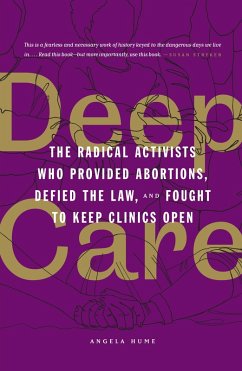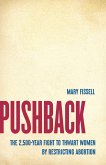The story of the radical feminist networks who worked outside the law to defend abortion.
Starting in the 1970s, small groups of feminist activists met regularly to study anatomy, practice pelvic exams on each other, and learn how to safely perform a procedure known as menstrual extraction, which can empty the contents of the uterus in case of pregnancy using equipment that can be easily bought and assembled at home. This "self-help" movement grew into a robust national and international collaboration of activists and health workers determined to ensure access to reproductive healthcare, including abortion, at all costs-to the point of learning how to do the necessary steps themselves.
Even after abortion was legalized in 1973 with Roe v. Wade, activists continued meeting, studying, and teaching these skills, reshaping their strategies alongside decades of changing legal, medical, and cultural landscapes such as the legislative war against abortion rights, the AIDS epidemic, and the rise of anti-abortion domestic terrorism in the 1980s and 90s. The movement's drive to keep abortion accessible led to the first clinic defense mobilizations against anti-abortion extremists trying to force providers to close their doors. From the self-help movement sprang a constellation of licensed feminist healthcare clinics, community programs to promote reproductive health, even the nation's first known-donor sperm bank, all while fighting the oppression of racism, poverty, and gender violence.
Deep Care follows generations of activists and clinicians who orbited the Women's Choice clinic in Oakland from the early 1970s until 2010, as they worked underground and above ground, in small cells and broad coalitions and across political movements with grit, conviction, and allegiances of great trust to do what they believed needed to be done-despite the law, when required. Grounded in interviews of activists sharing details of their work for the first time, Angela Hume retells three decades of this critical, if under-recognized story of the radical edge of the abortion movement. These lessons are more pertinent than ever following the Supreme Court's 2022 Dobbs v. Jackson decision and the devastation to abortion access nationwide.
Starting in the 1970s, small groups of feminist activists met regularly to study anatomy, practice pelvic exams on each other, and learn how to safely perform a procedure known as menstrual extraction, which can empty the contents of the uterus in case of pregnancy using equipment that can be easily bought and assembled at home. This "self-help" movement grew into a robust national and international collaboration of activists and health workers determined to ensure access to reproductive healthcare, including abortion, at all costs-to the point of learning how to do the necessary steps themselves.
Even after abortion was legalized in 1973 with Roe v. Wade, activists continued meeting, studying, and teaching these skills, reshaping their strategies alongside decades of changing legal, medical, and cultural landscapes such as the legislative war against abortion rights, the AIDS epidemic, and the rise of anti-abortion domestic terrorism in the 1980s and 90s. The movement's drive to keep abortion accessible led to the first clinic defense mobilizations against anti-abortion extremists trying to force providers to close their doors. From the self-help movement sprang a constellation of licensed feminist healthcare clinics, community programs to promote reproductive health, even the nation's first known-donor sperm bank, all while fighting the oppression of racism, poverty, and gender violence.
Deep Care follows generations of activists and clinicians who orbited the Women's Choice clinic in Oakland from the early 1970s until 2010, as they worked underground and above ground, in small cells and broad coalitions and across political movements with grit, conviction, and allegiances of great trust to do what they believed needed to be done-despite the law, when required. Grounded in interviews of activists sharing details of their work for the first time, Angela Hume retells three decades of this critical, if under-recognized story of the radical edge of the abortion movement. These lessons are more pertinent than ever following the Supreme Court's 2022 Dobbs v. Jackson decision and the devastation to abortion access nationwide.
Dieser Download kann aus rechtlichen Gründen nur mit Rechnungsadresse in A, D ausgeliefert werden.









